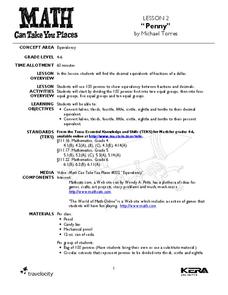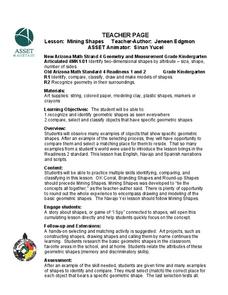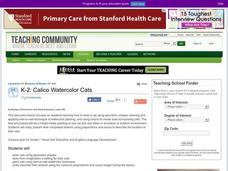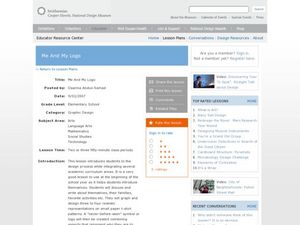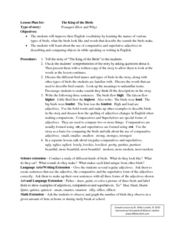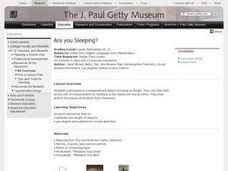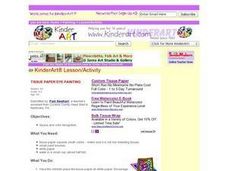Curated OER
Penny
Students explore the concept of equivalency. In this equivalents lesson, students use pennies to show equivalency as they divide them into groups. Students also convert the pencils into decimals and fractions.
Arizona State University
Mining Shapes
Youngsters recognize and identify shapes. They draw, and use modeling clay to make shapes. They also identify shapes in their environment and in the Navajo culture, then compare the shapes and sort them into groups. This is the...
Curated OER
Symmetrical Snowflakes
First graders, exploring lines of symmetry, follow directions to create a symmetrical snowflake from their own homemade icing. As a class, they discuss lines of symmetry and determine if specific shapes are symmetrical. After the lesson,...
Curated OER
Shaping Up!
Kindergartners are introduced to basic shapes. Learners spend 45 minutes a day in geometry centers carrying out the activities outlined in this ambitious plan. There are games, hands-on activities, interactive websites, art projects,...
Curated OER
Solving Math Problems In the Real World
Upper elementary and middles schoolers discuss and solve real world applications of math. They use formulas for volume and percents to answer real world questions. In the second part of the lesson plan, groups write and solve word...
Curated OER
Designing My Dream House
Seventh graders design possible dream house layouts. In this architecture lesson, 7th graders use sketch paper and a ruler to develop several rough sketches of a dream house. Students discuss how to use a scale for the floor plan.
Curated OER
Calico Watercolor Cats
A fun art project, this lesson incorporates math and listening skills as young artists play with a new painting technique. First the teacher models how to draw a cat using shapes, an oval for the body, triangles for the ears and so on,...
Curated OER
Me and My Logo
Young scholars design their own emblem. In this introduction lesson, students get to know one another by designing an emblem that combines symbols that represent themselves. They express themselves to their classmates.
Curated OER
Making Felt Bags
Pupils study the history of bags, pouches and purses. Use of these items spans the entire globe and encompasses practically every civilization. The activity culminates with learners creating their own bag from a variety of choices. The...
Curated OER
Spelling Counts!
Play a game to practice spelling and math. By assigning a numerical value to each letter of the alphabet, you can engage learners in "spy" coding and decoding activities that reinforce grade-appropriate spelling and math skills....
Curated OER
Where Am I, and How Do I Get Where I am Going?
Students describe geographical places through art, music, writing, and math. They compile information in booklets which may be published.
Curated OER
Class of Gold
How can you see a number in nature? Here, learners discover both Fibonacci numbers and the golden ratio by exploring a number of different resources. Note: Some of the resources are older and may be missing some of the links, but...
Curated OER
Read a Map
In this word problem worksheet, 5th graders use a coordinate grid as a map to answer 6 problems. They work with ordered pairs, locate quadrants, and apply the information to find items in the zoo.
Curated OER
Measurement Masterpiece
Here is a good, cross-curricular measurement and estimation lesson. Learners practice measuring paper strips to create an art project. This is a great way to introduce the ruler, and how it used, to your students.
Curated OER
The King of the Birds vocabulary
Science and language skills come together in The King of the Birds. After reading, discuss the names and types of birds in the story and write given sentences to portray the difference between comparative and superlative adjectives....
Curated OER
Are You Sleeping?
Here is a measurement lesson plan focusing on length. Learners use their feet as the unit of measurement for furniture in the classroom and at home, and sketch the pieces of furniture they measured.
Curated OER
Tissue Paper Dye Painting
Use tissue paper squares to create collage art. Young artists discuss colors as they place and glue each piece of tissue on the paper. Tip: Cut out large basic shapes instead. Have the class create images using the tissue...
Curated OER
Try Tessellation
Most middle schoolers probably feel that quilting is at best an activity left to their grandmothers. This lesson uses the Zome modeling system to get them to realize how shapes in quilting are really tessellations and repeating patterns....
Curated OER
Graphing Quadratic Equations with a Coefficient of One
This is a teacher page for a lesson and does not include any materials to support the lesson. Students graph quadratic equations with a coefficient of one and create a table of values to graph a quadratic equation. They plot the values...
Alabama Learning Exchange
Origami Geometry
Origami is an excellent way to combine Japanese culture, art, and geometric shapes into one engaging instructional activity! Scholars begin by listening to the story Sadako and the Thousand Paper Cranes and learn the origin of...
Curated OER
Crayon Resist
Kids usually love crayon resist projects. It is so fascinating for them to see how the dark paint accentuates and resists the waxy crayon. Here are instructions for executing a crayon resist project of your own. Tip: Make the project fit...
Curated OER
Are You Balanced?
Fifth graders discuss what it means to have balance in their lives. Individually, they are given a worksheet in which they list their activities and things they are involved in. To end the lesson, they place weights on each side of a...
Curated OER
Mosaic Tiles
I would consider this an outline and not a complete lesson plan. It would take a little work on your part because you would need to look on the internet for examples of Ojibwe art to show your pupils. They could explore the patterns that...
Curated OER
Symmetry of Road Signs
Students identify symmetry in road signs. In this geometry lesson, students explore objects in the real world for symmetry. They perform translation, rotation and reflection.
